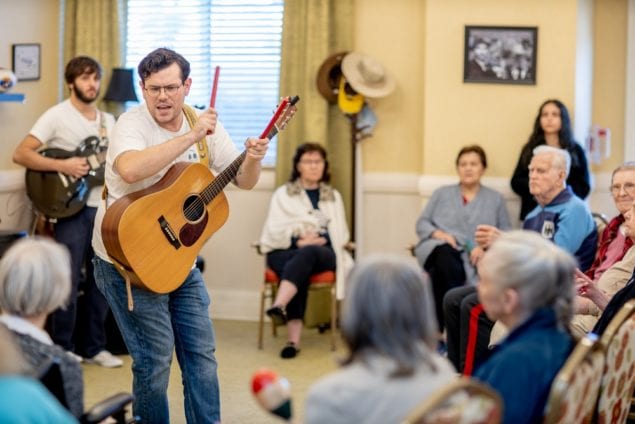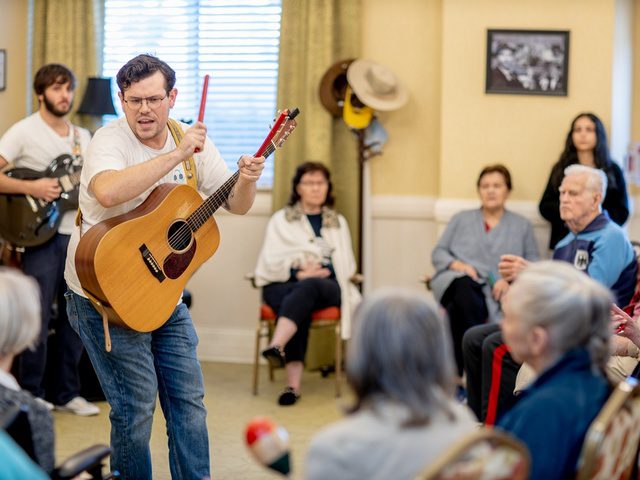
It is 3 p.m. at The Palace Gardens in Homestead’s memory care community and musicians are tuning their instruments for residents’ happy hour music. This scene takes place not just one day of the week, but every day of the week.
Providing live happy hour music is a tradition at all Palace communities but in memory care, its use is especially geared to helping the residents with various stages of Alzheimer’s disease and dementia.
Organized by the memory care activities director Jennifer Almodovar, certified therapeutic recreation specialist, the musicians offer a variety of musical entertainment using different instruments and songs, encouraging residents to sing along.
While Mondays feature Matt Anderson playing classic rock and roll and folk tunes on his acoustic guitar, on Saturdays Alan Aidao draws on his teaching expertise and plays the saxophone while engaging residents with musical questions.
Alzheimer’s research is indicating that music can be used to boost brain activity. After singing classic hits and show tunes from movies and musicals, Alzheimer’s patients can recall memories and emotions and have enhanced mental performance.
Almodovar sees the results firsthand among her residents.
Wanda, one of the younger residents, age 68, particularly enjoys dancing and singing to Anderson’s rock music while Ernesto, in the later stages of the disease and who is not coherent, becomes much more responsive and verbal after listening to music on an iPod. The impact of music is quite remarkable.
Citing the work of neurologist Oliver Sacks, Almodovar explained, “Music seems to bring back memories when nothing else can and the feeling of life”.
In addition to the varied live musical entertainment each day at The Palace Gardens, the nonprofit organization, Mind & Melody Inc., also offers music therapy at the community. The organization is known for its novel music programs to improve quality of life and reach and engage people at different levels of dementia and musical ability. The programs go beyond passively listening to music and are socially, cognitively, physically and creatively stimulating. Their staff brings a variety of different instruments to engage residents.
The Palace Gardens also uses iPods and these are readied with music to which residents particularly respond. When they are agitated, their caregivers can provide them with an iPod, cued to their musical preferences.
“People seem to think older people want soothing music but to the contrary,” Almodovar explained. “More upbeat music is popular. We have one resident who loves listening and singing to the vibrant songs of Celia Cruz. The music also connects with our Latin residents and many of the musicians play Spanish melodies.”
She explains that music is not only uplifting for residents. Staff dances and sings with residents and can be energized by music.
“We know through research that in the later stages of dementia, patients may lose the ability to share emotions with caregivers,” she said. “The dancing and moving to the music brings them closeness. It’s easier to hug and touch someone through the shared music experience.”
While many of the musicians have not had training working in memory care communities, they have been entertainers at other Palace communities and share a love of being with the elderly.
“It’s obvious that they derive a tremendous satisfaction from entertaining our residents,” Almodovar added.
“Their afternoon performances don’t keep them from regular gigs in the evenings at local restaurants and lounges and, through meeting families here at The Palace, their fan base and followers has grown.”
To learn more about The Palace Gardens, visit www.ThePalace.org.






